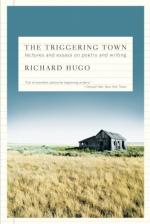
|
| Name: _________________________ | Period: ___________________ |
This test consists of 15 multiple choice questions and 5 short answer questions.
Multiple Choice Questions
1. What instrument does Lou McGarrity play?
(a) Tuba.
(b) Trombone.
(c) Piano.
(d) Flute.
2. Hugo believes that a public poet must be more intelligent than the reader so his _____ doesn't get in the way.
(a) Heart.
(b) Didacticism.
(c) Lack of common sense.
(d) Common sense.
3. Hugo advises that at all times, the student must keep his _____ on.
(a) Crap detector.
(b) Convention bucking device.
(c) Game face.
(d) Ability to copy.
4. Which person observes some mold and later cures gonorrhea?
(a) John George Alexander.
(b) Marie Curie.
(c) Sir Alexander Fleming.
(d) Alexander Graham Bell.
5. Specifically, Hugo asks students never to worry about _____.
(a) Critical acclaim.
(b) Money.
(c) The reader.
(d) Their grades.
6. Hugo believes that after a long time and a lot of writing, a poet can go back to places of _____.
(a) Creative genius.
(b) Insanity.
(c) Real personal significance.
(d) Cognitive recall.
7. What poem does Hugo describe as being "not good Hopkins"?
(a) "The Silver Jubilee".
(b) "The Golden Echo".
(c) "The Sea Took Pity".
(d) "The Handsome Heart".
8. One assumption says that the churches are always _____.
(a) Dirty.
(b) Full.
(c) Extreme.
(d) Empty.
9. In the poem by Ghiselin, the snake's dwelling is that of a _____.
(a) Another snake.
(b) Gopher.
(c) Horny toad.
(d) Prairie dog.
10. Hugo hopes that the student reading his book learns to write like _____.
(a) The author.
(b) Himself.
(c) Auden.
(d) Yeats.
11. At what age does Hugo start teaching?
(a) Forty.
(b) Sixty-five.
(c) Twenty-five.
(d) Fifty.
12. How much snow hits the town every year in one assumption?
(a) Seventy-seven inches.
(b) Four inches.
(c) None.
(d) Twenty feet.
13. Hugo states that all art that has endured has an element of _____.
(a) Disguise.
(b) Schmaltz.
(c) Plagiarism.
(d) Surprise.
14. Which colleague of Hugo's points out that "if you are not risking sentimentality, you are not close to your inner self"?
(a) Kittridge.
(b) Marvel.
(c) Herrick.
(d) Auden.
15. Where do people sit a lot in one assumption?
(a) In their cars at stoplights that don't work.
(b) On their porches.
(c) On their sofas.
(d) On swings in the park.
Short Answer Questions
1. According to Hugo, poets can go into the world of the imagination, and not feel so threatened that they _____.
2. In one of Hugo's assumptions, _____ at the farmer's market is punishable by death.
3. One of Hugo's assumptions states that the name of the triggering town must appear _____.
4. Hugo says that if one is a private poet, then one's vocabulary is limited to one's _____.
5. The surrounding country in one assumption is _____.
|
This section contains 409 words (approx. 2 pages at 300 words per page) |

|




